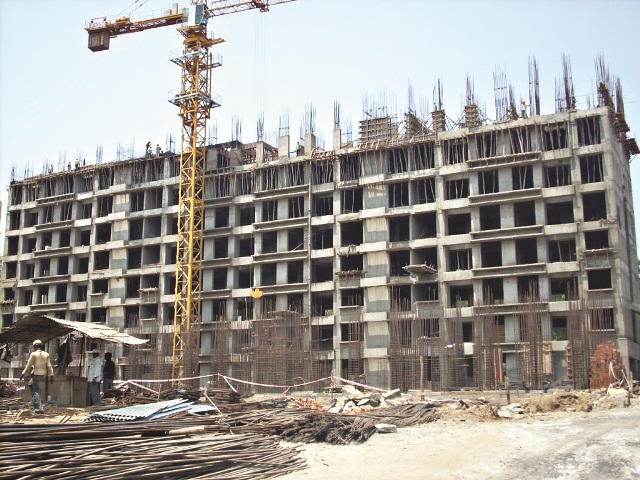The industry saw two game-changing developments in the form of the implementation of the Real Estate Regulation and Development Act (RERaD Act) and the Goods and Services Tax (GST). Implementation of both will improve the compliance and transparency levels within the industry. The relatively stronger player stands to benefit from these changes over the longer term.
Real estate sector, grappling with multi-fork regulatory and policy reforms, is expected to head towards consolidation. Outlook for residential real estate is likely to remain grim, while commercial real estate will be stable, according to industry analysts.
In last one and half years, regulatory changes such as implementation of the RERA, introduction of the insolvency and bankruptcy code, demonetization and GST may have impacted its operational performance. Nevertheless, these reforms will prepare ground for organized developers and also help affordable housing projects to gain momentum.
According to an analysis by ICRA, which expects that the industry will stabilize this year, regulatory changes introduced in the real estate sector such as implementation of the RERA, introduction of the insolvency and bankruptcy code and coming into force of Goods and Services Tax (GST) may have impacted its operational performance but are expected to pave the way for the industry’s consolidation going forward.
“Consolidation in the industry is likely to take place on the back of limited supply addition, especially from unorganised developers; realignment of business models of developers under the RERaD regime; impact of the Insolvency and Bankruptcy Code (IBC) on financially weaker developers; changing customer preference for completed projects, and entry of organised players into the affordable housing segment, which is expected to fare relatively better,” says Shubham Jain, vice president and sector hear, corporate ratings ICRA.
However, India Ratings and Research (Ind-Ra) continues to maintain a negative outlook for the residential real estate for the financial year 2019, as demand revival for properties is likely to be delayed due to the absence of a meaningful price reduction. On the other hand, the outlook for commercial real estate remains stable on account of continued demand, limited grade A supply and low refinancing risk.
A continued slump in residential unit sales is likely to impair cash flows and further increase debt and inventory levels in the sector. On the other hand, a price reduction despite rising cost of inputs such as steel and cement would lead to a margin squeeze for homebuilders, thereby negatively affecting their cash flows and credit profiles, Ind-Ra says in its report.
Regulatory reforms good for affordable housing projects
Affordable housing projects of Ind-Ra-rated companies witnessed a rise in their contribution to the overall sector sales to 20 percent to 40 percent. The uptrend is likely to gain momentum, with bank credit drifting towards the affordable segment. The government of India has awarded infrastructure status to affordable housing and permitted a larger area for the unit size under affordable housing. However, the progress on the Pradhan Mantri Awas Yojana has not been impressive, given over 90 percent of the work under the scheme is still pending in most states, the report said.
Commercial and retail demand
Ind-Ra expects demand for commercial office space to remain stable during the financial year 2019. The expectation is in view of demand from the banking and financial service sectors in Mumbai and the IT-ITeS and e-commerce sectors in other key cities such as Gurugram, Bengaluru, Chennai and Hyderabad.
Despite the growing e-commerce penetration, demand for retail space is likely to remain robust on account of limited grade-A supply in the cities mentioned above. Attractive yields, driven by stable demand conditions, would translate into ease of financing in this segment. Yields on office, retail and industrial buildings are likely to remain stable across major destinations, the report says.
Overall Scenario
Regulatory transitions have, in the short-term, adversely impacted the operational performance of the industry, which has been witnessing demand headwinds over the last couple of years due to elevated prices, an uncertain business environment, limited capital price appreciation and weak consumer confidence. Even as the effects of demonetisation started waning over the course of the year, the implementation of the RERaD and the GST, with effect from May 2017 and July 2017 respectively, put further pressure on the industry’s operational metrics, the ICRA analysis says.
The year 2017 for the real estate sector would be defined by the various regulatory transitions witnessed. After demonetisation, which was announced in November 2016, the industry saw two game-changing developments in the form of the implementation of the Real Estate Regulation and Development Act (RERaD Act) and the Goods and Services Tax (GST). Both the RERaD and the GST implementation will improve the compliance and transparency levels within the industry. The relatively stronger player stands to benefit from these changes over the longer term.
“Delays in the creation of requisite regulatory infrastructure and notification of rules by various state governments, as required under the RERaD Act, had created uncertainty, both for the developers and the prospective buyers. The GST implementation also resulted in a short-term impact on sales volumes as the developers took some time to work out costing implications under the new tax regime,” says Jain.
On the supply side, the developer community has been beset by high inventory levels, resulting in a demand-supply mismatch and delay in new launches. Implementation of the RERaD Act has also encouraged developers to focus on the completion of the existing projects. Furthermore, the regulatory changes resulted in re-evaluation and realignment of their business models in order to be better prepared to meet their delivery commitments.
ICRA also expects developers to take a cautious approach as far as new project launches are concerned, given the over-supply situation in various markets along with their stressed balance sheet positions. The focus is likely to remain on liquidation of existing stock and reduction of debt overhang before new projects are launched.
The RERaD Act is a right step in the right direction, providing a strong consumer-friendly framework, which can boost buyers’ sentiments and assuage concerns regarding project delays and fund diversions. The Act is also expected to help consolidate the market position of established and larger developers.
ICRA says that the government has also provided the right focus on the affordable housing segment through various sops to customers and developers. It is expected that with continued support, the supply in the segment will grow and cater to the inherent demand. Housing projects in the affordable to mid-market segment are likely to generate the bulk of the demand in the coming year and in ICRA’s opinion developers with inventory aligned to this would stand to benefit.
@EPC World






